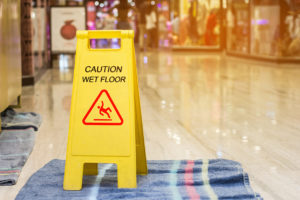An Interesting Perspective: Mode of Operation and Your Accident Case
Posted February 16th, 2017 by Anthony Carbone, PC.
Categories: Premises Liability.
 You may have never heard of the mode of operation rule. Or, have any clue how it might apply to your accident case. This could apply to your claim if it involved a hazardous condition inherent to a particular type of business. Mode of operation generally concerns premises liability cases.
You may have never heard of the mode of operation rule. Or, have any clue how it might apply to your accident case. This could apply to your claim if it involved a hazardous condition inherent to a particular type of business. Mode of operation generally concerns premises liability cases.
Here’s an example. You are at the local grocery store which features a self-serve salad bar. You park your shopping cart right next to the carpeted liner surrounding the buffet selection. You are only interested in having tuna fish salad for lunch and scoop a portion into a container. You now just need a lid.
As you walk around the uncarpeted area onto the tiled floor to find a cover, you feel yourself slipping. There are no handrails around the salad bar for you to grasp onto. Your shopping cart is also out of reach. You land heavily and are unable to get up on your own. The pain is incredible. Later, you find out that you broke your left ankle.
A store employee comes to help you. Of course, your tuna fish salad is on the floor. But, strangely enough, a piece of lettuce is stuck to the bottom of your shoe. You didn’t put any greens in your container. Where did it come from? It seems apparent that the lettuce was already on the floor. It also appears evident that the lettuce was slippery and caused you to fall.
Mode of Operation and Premises Liability
In premises liability cases, there is an expectation that the business proprietor had some knowledge or should have known of a dangerous condition. According to a New Jersey case, “the mode of operation doctrine ‘relieves the plaintiff of the burden of proving actual or constructive notice of the dangerous condition[,]’ creates ‘an inference of negligence,’ and requires defendants to produce evidence showing they did all that a reasonably prudent person would do.”
So, let’s return to our sample case. The grocery store should have known the inherent risks of allowing patrons to help themselves. There was obviously a chance that slippery substances could cause someone to slip and fall. Did the proprietor take any actions to avoid these types of accidents?
In discovery, it turns out that the food store was very aware that the salad bar posed a risk. An employee was assigned to stand and monitor the station during key hours. Admittedly, you were there during lunch time and someone should have been watching the area.
It comes out that the store was short-staffed. An employee scurried over to replenish the salad bar. However, no one had inspected or cleaned up the area debris since the previous morning. The registers were the prime area of attention.
The mode of operation rule would apply to this type of case. The business proprietor recognized the inherent risk associated with a self-service operation. It had adopted a procedure to avoid harm. Unfortunately, its failure to employ the requisite safety measures resulted in the accident.
Contact Us
At the Law Offices of Anthony Carbone, we are experienced in handling all types of premises liability cases. Contact us so that we can investigate your claim and consider legal action on your behalf.


